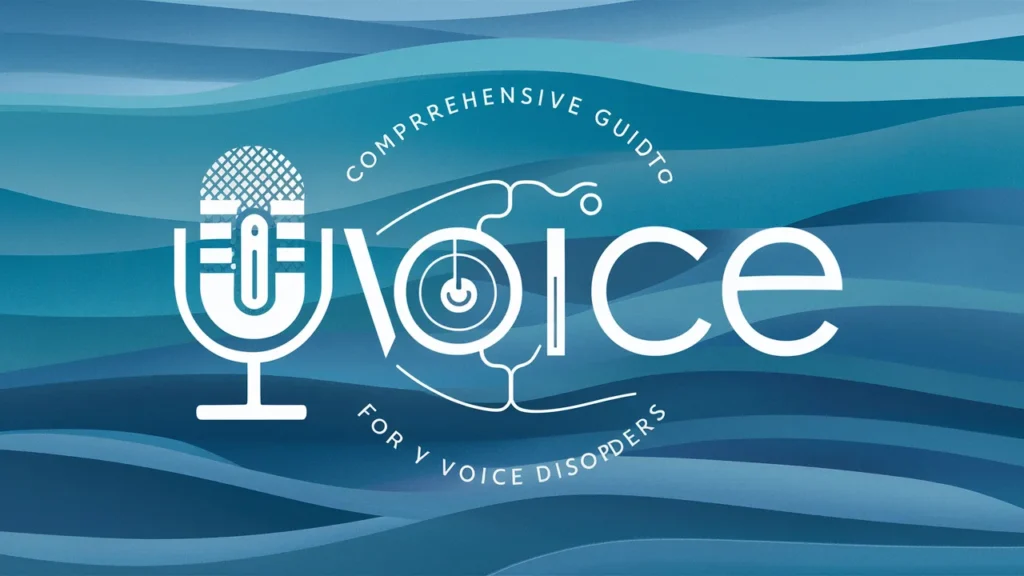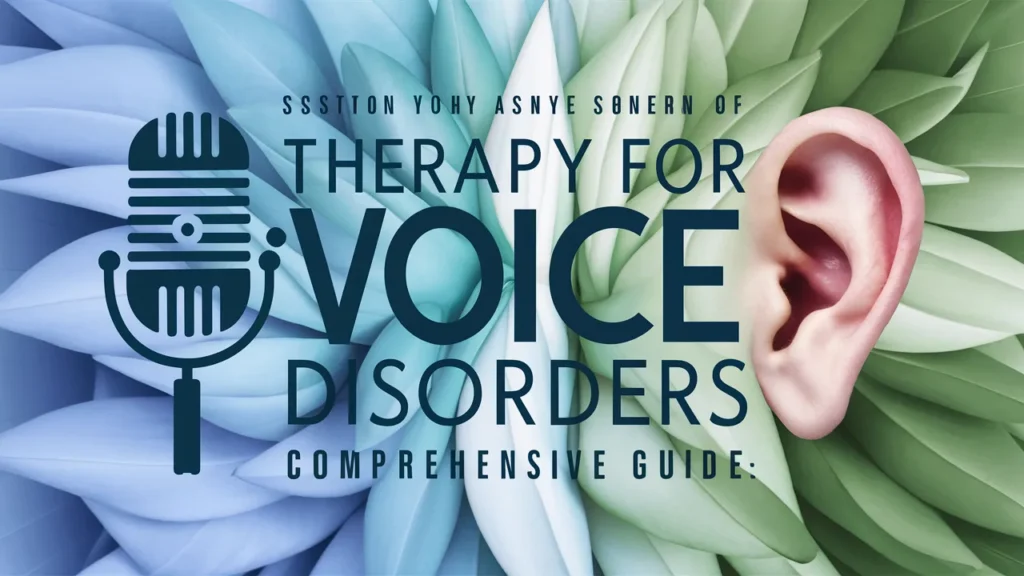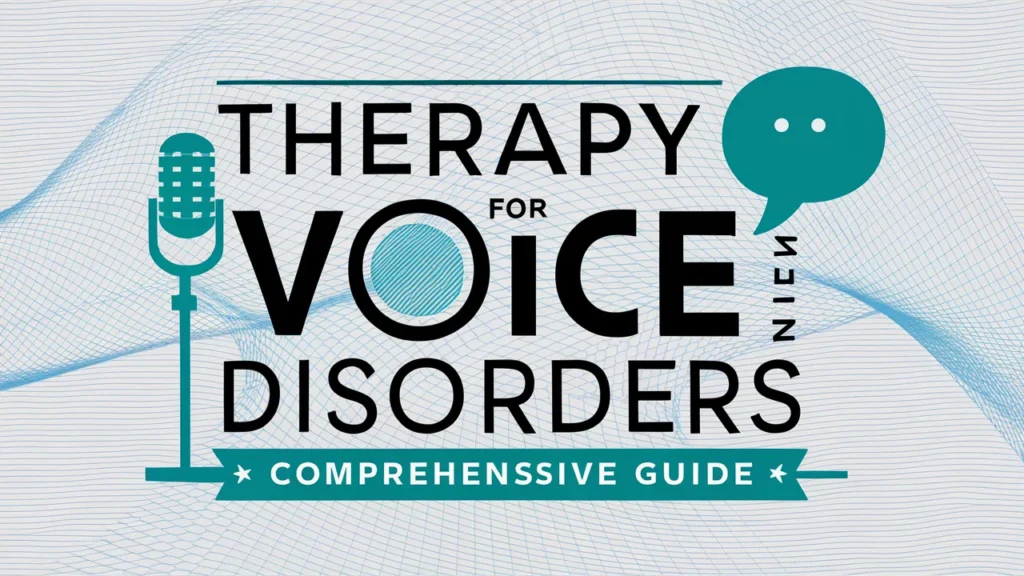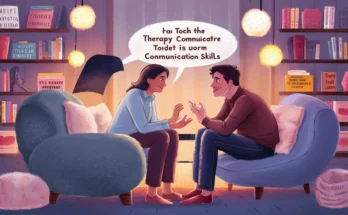can significantly impact an individual’s ability to communicate effectively, affecting both personal and professional aspects of life. Fortunately, various therapeutic approaches can help manage and treat these disorders. This article explores the different types of , their causes, and the therapies available to address them.

Understanding
occur when there are problems with pitch, volume, tone, and other qualities of the voice. These disorders can be caused by a variety of factors, including:
- Vocal Strain: Overuse or misuse of the voice, often seen in professionals like teachers, singers, and public speakers.
- Medical Conditions: Issues such as vocal cord nodules, polyps, cysts, and laryngeal cancer.
- Neurological Disorders: Conditions like Parkinson’s disease, multiple sclerosis, and vocal cord paralysis.
- Psychological Factors: Stress, anxiety, and other emotional factors can lead t0
- Infections and Inflammation: Laryngitis and other infections can cause temporary or chronic voice problems.
Types of
Functional
These disorders result from improper or inefficient use of the vocal mechanism. Common types include:
- Muscle Tension Dysphonia: Caused by excessive muscle tension around the voice box.
- Functional aphonia is a condition where a person can whisper but cannot produce a normal voice.
Organic
These are due to structural abnormalities in the vocal folds or larynx. Examples include:
- Vocal Nodules and Polyps: Benign growths on the vocal cords caused by vocal abuse.
- Laryngeal Cancer: Malignant growths on the vocal cords or larynx.
Neurological
These disorders stem from issues with the nervous system. Common examples are:
- Spasmodic Dysphonia: Involves involuntary spasms of the vocal cords.
- Vocal Cord Paralysis: Occurs when one or both vocal cords do not open or close properly.
Therapy Options for Voice Disorders
Voice Therapy
Voice therapy is a non-invasive treatment that involves exercises and techniques to improve vocal function. A speech-language pathologist (SLP) typically conducts this therapy. Key components include:
- Vocal Hygiene Education: Teaching patients how to care for their voices by staying hydrated, avoiding excessive throat clearing, and managing reflux.
- Breathing Exercises: Focusing on diaphragmatic breathing to support vocal production.
- Resonant Voice Therapy: Techniques to produce a clear, strong voice with minimal effort.
- Vocal Function Exercises: Systematic exercises to strengthen and balance the vocal muscles.

Medical and Surgical Interventions
In some cases, medical or surgical treatments may be necessary, such as:
- Medications: To treat underlying conditions like reflux or inflammation.
- Microsurgery: To remove vocal nodules, polyps, or other growths.
- Botulinum Toxin Injections: Used for spasmodic dysphonia to reduce muscle spasms.
Alternative Therapies
Other therapies can complement traditional voice therapy, including:
- Psychotherapy: To address psychological factors contributing to voice disorders.
- Acupuncture: May help reduce tension and improve vocal quality.
- Biofeedback: Uses real-time data to help patients learn to control their vocal muscles better.
FAQs About Therapy for Voice Disorders
What are the common symptoms of voice disorders?
Common symptoms include hoarseness, voice fatigue, reduced vocal range, pain or discomfort while speaking, and loss of voice.
How is a voice disorder diagnosed?
A voice disorder is typically diagnosed by an otolaryngologist (ENT doctor) who examines the vocal cords using laryngoscopy. A speech-language pathologist may also assess vocal function through various tests.
Can voice disorders be prevented?
Yes, many voice disorders can be prevented by practicing good vocal hygiene, such as staying hydrated, avoiding yelling or whispering, and taking vocal breaks during prolonged speaking.
How long does voice therapy take?
The duration of voice therapy varies depending on the severity of the disorder and the individual’s progress. It can range from a few weeks to several months.
Is surgery always necessary for treating voice disorders?
No, surgery is not always necessary. Many voice disorders can be effectively managed with voice therapy alone. Surgery is typically considered when there are structural abnormalities that cannot be addressed through therapy.
What lifestyle changes can help improve voice disorders?
Lifestyle changes that can help include avoiding smoking, reducing caffeine and alcohol intake, managing stress, staying hydrated, and avoiding excessive vocal strain.
Are there specific exercises to improve my voice?
Yes, a speech-language pathologist can provide specific exercises tailored to your needs, including breathing exercises, vocal warm-ups, and techniques to improve resonance and projection.
Can children develop voice disorders?
Yes, children can develop voice disorders due to vocal abuse, infections, or congenital abnormalities. Pediatric voice therapy can help address these issues.
How effective is voice therapy?
Voice therapy is highly effective for many individuals with voice disorders. Success depends on the type and severity of the disorder, as well as the individual’s commitment to the therapy process.
Can voice disorders recur?
Voice disorders can recur, especially if the underlying causes are not addressed or if vocal hygiene practices are not maintained. Regular follow-ups with a speech-language pathologist can help prevent recurrence.

Conclusion
Voice disorders can be challenging, but with the right therapeutic approach, many individuals can achieve significant improvement in their vocal quality and overall communication abilities. Whether through voice therapy, medical interventions, or lifestyle changes, addressing the underlying causes and adopting healthy vocal practices are key to managing and overcoming voice disorders. If you suspect you have a voice disorder, consult with a healthcare professional to explore the best treatment options for your specific needs.



